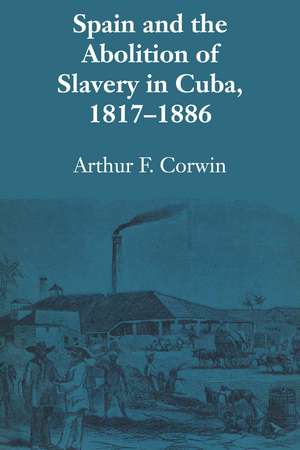Spain and the Abolition of Slavery in Cuba, 1817–1886: LLILAS Latin American Monograph Series
Autor Arthur F. Corwinen Limba Engleză Paperback – 1967
Arthur Corwin finds that the study of this problem falls naturally into two phases, the first of which, 1817–1860, traces the gradual reduction of the African traffic to the Spanish Antilles and constitutes, in effect, a study in Anglo-Spanish diplomacy. He gives special attention here to the aggressive nature of British abolitionist diplomacy and the mounting but generally ineffective indignation resulting from Spanish failure to apply sanctions against the traffic, as well as the increasing North American interest in the annexation of Cuba. The first phase has for its principal theme the manner in which for decades Spain feigned compliance with agreements to end the slave trade while actually protecting slaveholding interests as the best means of holding Cuba.
The American Civil War, which destroyed the greatest bulwark of black slavery in the New World, marked the opening of a new phase, 1860–1886. The author strongly emphasizes here such influences as the rise of the Creole reform movement in Cuba and Puerto Rico, which, reading the signs of the times, gave the initial impulse to a Spanish abolitionist movement and contributed to closing the Cuban slave trade in 1866; the liberal revolution of 1868 in Spain and its promise of colonial reforms; the outbreak of the great Creole rebellion in Cuba, 1868–1878, and the abolitionist promises of the rebel chieftains; the threat of American intervention and the abolitionist pressure of American diplomacy; and the protests of the Spanish reactionaries in Spain and Cuba, leading to further procrastination in Madrid. The second phase has as its principal theme the shaping, through all these intertwined factors, of Spain’s first measure of gradual emancipation, the Moret Law of 1870, and all subsequent steps toward abolition.
Din seria LLILAS Latin American Monograph Series
-
 Preț: 123.28 lei
Preț: 123.28 lei -
 Preț: 197.60 lei
Preț: 197.60 lei -
 Preț: 158.95 lei
Preț: 158.95 lei -
 Preț: 224.14 lei
Preț: 224.14 lei -
 Preț: 199.89 lei
Preț: 199.89 lei -
 Preț: 263.34 lei
Preț: 263.34 lei -
 Preț: 160.09 lei
Preț: 160.09 lei -
 Preț: 198.73 lei
Preț: 198.73 lei -
 Preț: 240.63 lei
Preț: 240.63 lei -
 Preț: 200.06 lei
Preț: 200.06 lei -
 Preț: 203.36 lei
Preț: 203.36 lei -
 Preț: 199.89 lei
Preț: 199.89 lei -
 Preț: 198.90 lei
Preț: 198.90 lei -
 Preț: 198.90 lei
Preț: 198.90 lei -
 Preț: 305.21 lei
Preț: 305.21 lei -
 Preț: 200.66 lei
Preț: 200.66 lei -
 Preț: 280.43 lei
Preț: 280.43 lei -
 Preț: 203.36 lei
Preț: 203.36 lei -
 Preț: 203.73 lei
Preț: 203.73 lei -
 Preț: 198.90 lei
Preț: 198.90 lei -
 Preț: 158.36 lei
Preț: 158.36 lei -
 Preț: 200.28 lei
Preț: 200.28 lei -
 Preț: 232.08 lei
Preț: 232.08 lei -
 Preț: 160.48 lei
Preț: 160.48 lei -
 Preț: 225.50 lei
Preț: 225.50 lei -
 Preț: 158.75 lei
Preț: 158.75 lei -
 Preț: 199.51 lei
Preț: 199.51 lei -
 Preț: 240.26 lei
Preț: 240.26 lei -
 Preț: 282.17 lei
Preț: 282.17 lei -
 Preț: 280.59 lei
Preț: 280.59 lei -
 Preț: 277.16 lei
Preț: 277.16 lei -
 Preț: 200.66 lei
Preț: 200.66 lei -
 Preț: 198.90 lei
Preț: 198.90 lei -
 Preț: 375.00 lei
Preț: 375.00 lei -
 Preț: 239.87 lei
Preț: 239.87 lei -
 Preț: 203.36 lei
Preț: 203.36 lei -
 Preț: 232.88 lei
Preț: 232.88 lei -
 Preț: 159.51 lei
Preț: 159.51 lei -
 Preț: 231.70 lei
Preț: 231.70 lei -
 Preț: 199.89 lei
Preț: 199.89 lei -
 Preț: 241.02 lei
Preț: 241.02 lei -
 Preț: 200.26 lei
Preț: 200.26 lei -
 Preț: 263.93 lei
Preț: 263.93 lei -
 Preț: 158.20 lei
Preț: 158.20 lei -
 Preț: 223.56 lei
Preț: 223.56 lei -
 Preț: 203.73 lei
Preț: 203.73 lei -
 Preț: 160.27 lei
Preț: 160.27 lei -
 Preț: 225.50 lei
Preț: 225.50 lei -
 Preț: 241.38 lei
Preț: 241.38 lei
Preț: 299.28 lei
Nou
Puncte Express: 449
Preț estimativ în valută:
57.29€ • 62.25$ • 48.15£
57.29€ • 62.25$ • 48.15£
Carte tipărită la comandă
Livrare economică 21 aprilie-05 mai
Preluare comenzi: 021 569.72.76
Specificații
ISBN-13: 9781477301333
ISBN-10: 147730133X
Pagini: 406
Dimensiuni: 152 x 229 x 15 mm
Greutate: 0.45 kg
Editura: University of Texas Press
Colecția University of Texas Press
Seria LLILAS Latin American Monograph Series
ISBN-10: 147730133X
Pagini: 406
Dimensiuni: 152 x 229 x 15 mm
Greutate: 0.45 kg
Editura: University of Texas Press
Colecția University of Texas Press
Seria LLILAS Latin American Monograph Series
Notă biografică
Arthur F. Corwin specialized in Latin American studies.
Cuprins
- Prologue
- 1. How African Slaves Were First Brought to the Antilles
- 2. The Planting of a Diplomatic Problem, 1815-1820
- 3. A Chapter in Slave-Trade Diplomacy, 1820-1825
- 4. A United Front in Cuba, 1825-1840
- 5. Britain Grows More Aggressive, 1840-1848
- 6. The Status Quo Reaffirmed in the Face of New International Threats, 1848-1851
- 7. A More Serious Effort To Suppress the Slave Traffic, 1851-1860
- 8. Signs of Change, 1855-1865
- 9. Abolitionism Invades Spain, 1863-1866
- 10. Two Hesitant Steps Forward, 1865-1866
- 11. Great Expectations: The Reform Commission of 1866-1867
- 12. The Glorious Revolution: A New Horizon, 1868-1870
- 13. The Moret Law: An Entering Wedge, 1870
- 14. Behind the Scenes: Failure To Enforce the Law, 1870-1872
- 15. Application of the Moret Law and Abolition in Puerto Rico, 1872-1873
- 16. Epilogue: Last Days of Spanish Slavery, 1873-1886
- Bibliography
- Glossary
- Index
Descriere
This book explores the abolition of African slavery in Spanish Cuba from 1817 to 1886—from the first Anglo-Spanish agreement to abolish the slave trade until the removal from Cuba of the last vestige of black servitude.













